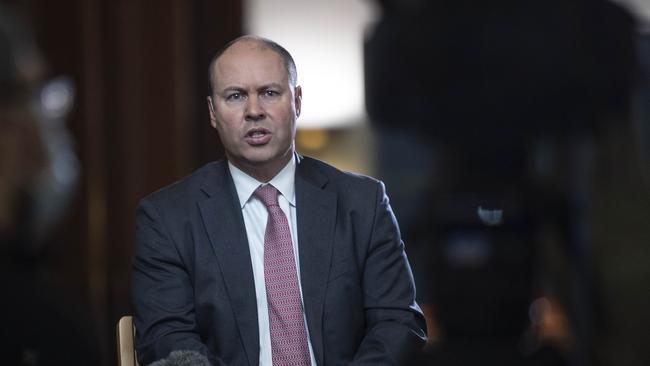Tech giants Google and Facebook, Australian media in ‘world first’ mandatory bargaining code
Google and Facebook will be required to pay media companies or face massive fresh penalties under landmark Australian laws.

Global tech giants will be forced to pay for news and face fines of up to $10m if they fail to treat Australian media companies fairly, under a new mandatory code unveiled on Friday.
Josh Frydenberg unveiled a mandatory bargaining code that will make digital platforms share key data with news companies, and warn them of any changes to their algorithms.
Google and Facebook will also be forced to negotiate with media companies, after years of pilfering their content for free.
The Australian Competition and Consumer Commission will have the power to issue fines of up to 10 per cent of the tech giants’ revenue, which would amount to billions of dollars, if they break the rules of the code.
“It became apparent to us a number of months ago that we weren’t making progress on that critical issue of payment for content. Hence we are moving down the path of a mandatory code,” the Treasurer said in Melbourne.
“A mandatory code that governs those relationships and covers issues such as access to user data, the transparency of algorithms used by the digital platforms for the ranking and the presentation of media content, as well as of course payment for content.
“What we‘ve sought to do with this mandatory code is not protect Australian news media businesses from competition, or from disruption that’s occurring across this sector.

Mr Frydenberg said he intended to introduce the legislation by the end of this year.
ACCC boss Rod Sims, who developed the mandatory bargaining code, said if media companies and the tech giants could strike a deal through a three month negotiation and mediation process, then an independent arbitrator would choose which of the two parties’ final offer was the most reasonable within 45 business days.
“I am hopeful, and I actually expect, that other places around the world will learn from what we’ve done,” Mr Sims told The Australian. “This will set a precedent around the world, and hopefully is something we can contribute to more sustainable news media businesses around the world.”
“Hopefully the digital platforms will realise they have to mature as businesses. They can’t keep taking advantage of free content.”
Mr Sims said the code was born out of a fundamental bargaining power imbalance between news media businesses and the major digital platforms.
“They’re just behaving like a monopolist,” he said. “This mandatory code will be a forcing device for real discussions on payment that haven’t happened before. And I think it will change behaviour, because whenever you’re dealing with someone who’s got substantial market power, and you find a way of evening up the bargaining imbalance, then you get changed behaviour.”
He added that he’d been in contact with regulators internationally, including in the UK, where the market regulator had recently released a report on reining in the tech giants.
“In developing our draft code, we observed and learned from the approaches of regulators and policymakers internationally that have sought to secure payment for news,” Mr Sims said.
“We wanted a model that would address this bargaining power imbalance and result in fair payment for content, which avoided unproductive and drawn-out negotiations, and wouldn’t reduce the availability of Australian news on Google and Facebook.
“We believe our proposed draft code achieves these purposes.”
He added that the draft code will initially apply only to Google and Facebook, but other digital platforms may be added in the future if there’s a power imbalance.
“News content brings significant benefits to the digital platforms, far beyond the limited direct revenue generated from advertising shown against a news item. News media businesses should be paid a fair amount in return for these benefits,” Mr Sims said.
“We believe that our final offer arbitration proposal provides a compelling incentive for parties to put forward fair and reasonable proposals, given each has just one chance to make an offer, and only one offer can prevail.”
“We have ensured that the cost of producing journalism would be taken into account in arbitration. However, the arbitrator is also required to consider whether the payment proposals from news media businesses place an undue financial burden on the digital platforms,” Mr Sims said.
Google and Facebook have been contacted for comment.
‘Watershed moment’
News Corp Australasia executive chairman Michael Miller said the Morrison government’s code of conduct was a “watershed moment” and declared the “platforms’ days of free-riding are ending”.
“While other countries are talking about the tech giants’ unfair and damaging behaviour, the Australian government and the ACCC are taking world-first action. I congratulate them for their leadership,” Mr Miller said.
“The tech platforms’ days of free-riding on other peoples’ content are ending. They derive immense benefit from using news content created by others and it is time for them to stop denying this fundamental truth.
“The ACCC’s draft Code of Conduct is a watershed moment; it can force the platforms to play by the same rules other companies willingly follow and it ultimately means they will no longer be able to use their power to walk away from negotiations with news creators.”
Mr Miller said the code of conduct had the “potential to benefit all Australians by securing the future for the people and companies who serve real communities with real news”.
“I look forward to entering into negotiations with the platforms as soon as possible,” he said.
A Nine spokesman welcomed the ACCC-led code of conduct and said the government recognised the “importance of the regulatory and bargaining imbalances” that exist between Australian media companies and the dominant global digital platforms.
“We are confident that following this important step in the process we are positioned to achieve an outcome which will ensure significant long term benefits to our news organisation,” the Nine spokesman said.
ABC not happy
While commerical brodcasters welcomed the new code, an ABC spokesman referred The Australian to its June submission to the ACCC after the public broadcaster, and SBS, were excluded from the bargaining conditions included in the draft code of conduct.
In its submission, the ABC argued it should be part of any framework facilitating access to revenue arrangements with digital platforms.
“If the ACCC forms the view that there is value to third-party digital platforms in having news media content (including from the ABC) and establishes a mechanism for platforms to better share this value with news media organisations then the ABC should be part of this framework,” the ABC submission said.
“Any additional revenue accruing to the ABC as a result of the Code would be applied to the delivery of ABC Charter objectives. In this case, the ABC’s disposition would be to direct funds to further investment in public interest journalism at the local and regional level.
“The ABC is aware of an argument that it should not be able to share in any such revenue, should the Code contain this type of framework, because it is publicly funded by government. “If digital platforms are deriving value from the use of ABC news content on their platforms or products, the ABC and taxpayers have a legitimate interest in ensuring that a portion of that value is reinvested into ABC journalism.”







To join the conversation, please log in. Don't have an account? Register
Join the conversation, you are commenting as Logout